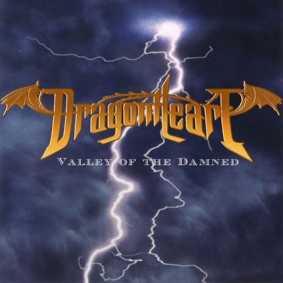A self-made legend. - 91%
There is a definite history to this band that younger fans and current day detractors are not aware of, and it began right here. Before the urban legends of faked guitar parts, studio miracles, and other mumbo jumbo chanted like holy mantras about this band’s alleged lack of credibility, there was a mostly straightforward power metal outfit of the late 90s persuasion that set out to take the genre to its absolute extreme. They did this without any label support, any of the fictional studio magic tricks that are still, though many will deny it, alien to this band. They recorded in a mere 7 days, which is only 3 days longer than it took to create the famed Grim Reaper debut, and 2 days less than their slightly lesser known follow up, and it’s the closest that you’ll get to a live album with these guys thus far.
But what does it mean to take power metal to its absolute extreme? It means to play it as ridiculously fast, as catchy, and as flashy as you can and send a nice one-fingered salute to cynical morons who think musical credibility ends when you add a fourth chord to a song. It’s a certifiable “fuck you” to the entire culture of the 90s alternative rock scene and their flock of dumb assed, anti-virtuoso heroes who should have stuck to their landscaping jobs. It has zero reservations about writing what some might say are too many notes, it doesn’t bow to the AOR standard of 4 minutes or less or it’s not a song, and it doesn’t know the meaning of the word cheesy unless it refers to the food item.
Throughout metal’s lengthy history, the concept of the dual guitar attack evolved from Tony Iommi overdubbing multiple lead tracks on Sabbath’s early work to the apparent excesses of the Downing/Tipton, Murray/Smith, and Hansen/Weikath solo duels. Although not as common in the early revival of the power metal style, where only certain progressive leaning bands like Labyrinth dabbled in trading leads between multiple guitars, DragonHeart brought back this concept and amplified nearly tenfold. It gets to the point where the guitar leads have a virtual full partnership with the vocal front man and drive the songs more than the riffs do.
Admittedly, this sort of power metal is not riff oriented, but instead more of a melodic venture in the Keepers era Helloween format. Verses and choruses will showcase simple chord progressions that vary in speed and rhythmic emphasis rather than the elaborate riff interchanges common to power/thrash and USPM outfits. At times the chord structures are simplistic enough that punk oriented sounds come through the flurries of speed licks and sweep picking, due in no small part to Sam Totman’s preference to chorus oriented songs and basic structural workings, as well as the consonant melodies delivered in a Michael Kiske meets Jon Bon Jovi fashion by vocalist ZP Theart.
When you combine all of this with a barrage of speed metal drum beats and occasionally emphasized bass work what results is 5 extremely catchy, yet epic songs. Totman dominates the songwriting department here and presents us with 4 songs that might be radio friendly if they weren’t so long and so far removed from the consensus on what constitutes the proper length of an instrumental break. Of these, the title track and “Black Winter Night” are the clear winners in terms of melodic majesty, while “Revelations” sort of listens like a solid middle ground between the two. The archetype ballad and perhaps the lone weak point on here is “Starfire”, which lacks the speed and fury of the band’s winning formula, and comes off as a little bit plain. ZP’s voice is at it’s roughest on this one as well, sometimes slightly missing the mark or faltering slightly under the weight of an overdone attempt at intensity.
By contrast, “Disciples Of Babylon” shows the progressive tendencies of the band starting to emerge a little. Although the principle format of this song sticks relatively close to the hyper speed variation on the simplistic riffs of the NWOBHM style, Herman Li decides to one up Totman in the songwriting department with an epic acoustic interlude ala Manowar, but with a little bit of a Dream Theater character to it. Clive Nolan was brought in to do the closing keyboard solo, which was likely the sole slot for former keyboardist Steve Williams, who left the band to form rival power metal outfit Power Quest. The solo has a slight Jordan Rudess character to it, although most would likely associate it more with Jens Johannsen due to the style being closer to Stratovarius than the band of the former. Nonetheless, this is the best song on here and perhaps an early hint to the band’s more recent sound tendencies.
Insofar as demos go in the power metal genre are concerned, this is by far the greatest produced thing that I’ve ever encountered. The level of disconnect in sound quality in this, when compared with the full length studio album by the same title, is not very noticeable. It’s also the band in their most stripped down nature, without additional lead overdubs to amplify and augment what are already extremely elaborate lead duels. The only shame is that this demo has never been re-released, but with the advent of online file sharing, it is out there for anyone looking to educate themselves about where this band came from, and it sure as hell wasn’t in a music industry planning room. There is absolutely nothing mainstream friendly about this music, and can only be described as either an act of God or a twist of chance that the mainstream came to this talented, integrity rich outfit.

